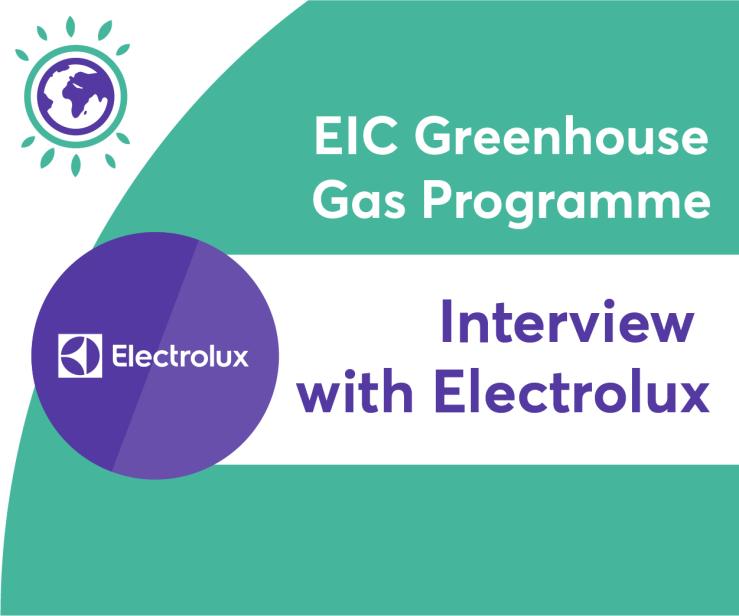Under the EIC Greenhouse Gas (GHG) Programme, beneficiaries work together to co-create new green solutions with business partners to address pivotal sustainability challenges. Following an EIC GHG co-creation event with Electrolux, we had the opportunity to meet with Beatrice Maestri, Electrolux Open Innovation Manager, and Alberto Chiappinotto, Electrolux Group Operations Sustainability Leader. Here’s what they had to say.
Can you briefly describe your role at Electrolux and explain your motivations for joining the EIC GHG initiative?
Alberto Chiappinotto: I lead the Electrolux Green Spirit Program in our Operations department at the Group level. The Green Spirit program is our internal resource efficiency program and rating system that includes criteria related to climate, energy and water performance, management, engagement and actions that are reviewed annually. The program is continuously improved to reduce our environmental impact and operational costs. It also drives and promotes the sharing and implementation of best practices among our manufacturing sites globally.
Beatrice Maestri: I’m responsible for Open Innovation at Electrolux. Together with the Open Innovation team, we support the entire company to identify internal challenges and address future opportunities by leveraging the external innovation ecosystem. We also help the organisation find applicable solutions, technologies, products and processes.
Being part of this initiative gives us the opportunity to accelerate Electrolux’s achievements within our sustainable operations and put us in direct contact with a selected pool of SMEs proposing new solutions to reduce the carbon footprint – sometimes meaning having early access to technologies not yet available on the market – sharing the same ambition as Electrolux and the same goal of co-partnering to develop new applications.
The EIC GHG Programme is all about reducing GHG emissions and moving towards a carbon-neutral future. What is your company doing in this regard?
Alberto Chiappinotto: Firstly, our sustainability framework – For the Better 2030 – defines how Electrolux works to achieve Better Company, Better Solutions and Better Living with Goals for 2030. It includes our most important sustainability issues and helps us strive toward our purpose to shape living for the better.
Secondly, our operational resource management – including energy, water, waste and emissions – is coordinated globally with a common process and strategy regardless of where in the world we operate. In addition, we have a comprehensive approach to reducing our climate footprint – including both our operations and the lifecycle impact of our products.
At Electrolux, we will continue to reduce our environmental footprint by shifting to renewable energy and optimising the use of energy and other resources throughout our operations. We aim to have climate-neutral operations by 2030 and to ultimately become climate neutral throughout our entire value chain by 2050.
We invite you to read our latest Sustainability Report, where you can read all about our journey to become climate neutral and more.
Unlike other flagship Business Acceleration Services programmes, this initiative is focused on co-creation as opposed to single rounds of pitching. What does co-creation mean for your company/yourself and what are the benefits compared to a “normal” pitching session?
Beatrice Maestri: The benefits are clear as we – both the companies and beneficiaries – set expectations from the beginning. If there’s a good fit between the challenge(s) and the solution(s) proposed, the common intent is to further co-develop it in a way that solves the problem and addresses the case-specific application. This brings the idea that as a company, we are aware that we might not be able to develop a ready-made solution on our own, but that we may need to work together to co-create it. This matches the way we usually work with Open Innovation at Electrolux.
What mindset and skills do you look for in companies (start-ups and scale-ups) for co-creation activities?
Beatrice Maestri: The right mindset is as relevant as the innovation capabilities and is a fundamental prerequisite to making the collaboration work. Co-development and co-creation initiatives generally have well-defined ambitions and goals, but these are not always achieved on the first attempt. Agility, flexibility, openness, and teamwork across both organisations (us and the beneficiary) working together are the must-haves to make a collaboration thrive. Importantly, we must be able to challenge the Status Quo when it comes to the way of working. Capabilities, know-how and expertise are also important – even if from other industrial applications. Therefore, we could say “everything that’s around and beyond the single solution” is as important as the mindset.
What are the benefits/advantages of working with the EIC and its portfolio of SMEs?
Beatrice Maestri: Given that the SMEs are qualified, we know the companies in the EIC portfolio are stable and reliable. They’re sometimes also supported by dedicated services, like the Business Acceleration Services (BAS) Programme, which means they’re aware of how corporations work and how expectations are set when it comes to collaborating.
What are your views on the online event and the quality of the companies pitching?
Beatrice Maestri: The companies were well prepared, made good pitches and focused on the relevant aspects of their value proposition. This created the right background, and we will dig deeper into this in the 1:1 interviews.
To conclude, what would make this EIC GHG Co-creation initiative a success for your company and what are you hoping to get out of it?
Beatrice Maestri: As practice leader for Open Innovation, I believe success comes from either implementing a solution within our operations or from a pilot activity. This means something is successful if both parties involved can test and learn from each other and the activity carried out. Regardless of the success of the solution in solving the challenge, -which is indeed the ultimate goal-, we can improve our understanding and capitalise on the following: if a solution doesn’t work, it is also important to understand why it didn’t, to move on and look for other opportunities.

DISCLAIMER: This information is provided in the interest of knowledge sharing and should not be interpreted as the official view of the European Commission, or any other organisation.

